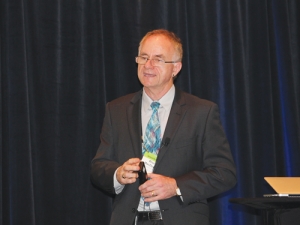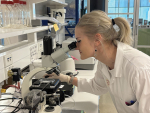The University of Auckland is leading a collaborative project to build multi-purpose robotic systems for orchards.
And the project drew high praise from another robotics expert, Robert Fitch from the University of Sydney. The project would “revolutionise automated harvesting”, he said at the MobileTECH conference in Auckland last week.
Agricultural robotics is a new “hot topic” and Australia and New Zealand are leading the world, he said. The orchard project was an example of that.
Bruce MacDonald, of Auckland University, described the project which has several partners and started just late last year. A key objective was to create robotic directional targeted precision spraying. Initially they were looking at pollinating flowers, but it could be used for other spray purposes.
They also planned to create arms and grippers for harvesting, in particular kiwifruit and apples.
Cameras would be used to find and track flower and fruit with the mobile ground platform moving through the orchard. “That enables you to find and pollinate just the flowers with just the right amount of pollen – currently with kiwifruit – and the big market is apples,” he told the conference.
A key objective is to export this technology to the global orchard industry and that is the mission of the company involved in the collarboration, Robotics Plus. Improving production for New Zealand is another goal. “The idea is to address three key problems – labour, rising costs and yield security.” Other orchard operations will be addressed in the future.
The collaborative multi-purpose orchard robotics project, funded by MBIE, started late last year. Two years was spent rounding up partners so when the project came along it was easy to put together.
The University of Auckland is leading the project and working on the sensing and software; Robotics Plus and the University of Waikato are focusing on the electro-mechanical systems such as the platforms that drive through the orchards, the arms and some spraying systems. Another Auckland group is looking at pollen spraying systems.
Robotics Plus is active in this project, involved in research from the beginning including orchard test sites. There’s an advisory board and a group of significant Maori groups interested. The project has just started and they are gathering young researchers including locals and people from overseas. A long term mission is to retain researchers in the business.
The project aims for early integration of some first versions of the technology and to use a seasonal testing process. They want to be testing it in orchards in the flowering season each year and in the fruit season as well. “So they want the science coming out of the laboratory almost immediately, test it in the field then go back and improve it,” says MacDonald.



















